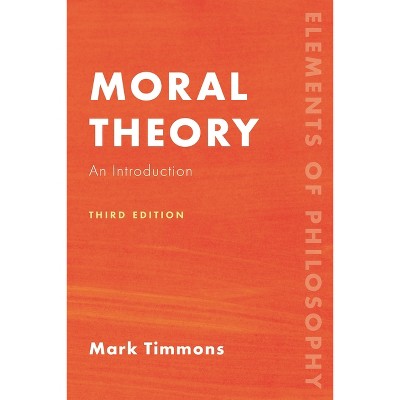About this item
Highlights
- In this expanded edition of The Evil of Banality, Elizabeth Minnich argues for a tragic yet hopeful explanation of "extensive evil," her term for systematic, normalized harm-doing on the scale of genocide, slavery, sexualized dominance.
- About the Author: Elizabeth Minnich received her doctorate from the Graduate Faculty of The New School under the direction of Hannah Arendt, whom she served as teaching assistant.
- 294 Pages
- Philosophy, Ethics & Moral Philosophy
Description
About the Book
The expanded edition of The Evil of Banality builds on Elizabeth Minnich's tragic yet hopeful explanation of extensive evil, with a new preface, new chapter, and expanded afterword addressing ongoing evils, the paradox of lying, and the importance of developing the thinking without which conscience remains mute.Book Synopsis
In this expanded edition of The Evil of Banality, Elizabeth Minnich argues for a tragic yet hopeful explanation of "extensive evil," her term for systematic, normalized harm-doing on the scale of genocide, slavery, sexualized dominance. The book now includes a new preface, new chapter, and expanded afterword addressing ongoing extensive evils, the paradox of lying, and the importance of developing the thinking without which conscience remains mute.
Extensive evils are actually carried out not by psychopaths, but by people like your quiet next-door neighbor, your ambitious colleagues. There simply are not enough moral monsters to do the long hard work of extensive evils, nor enough saints for extensive good. In periods of extensive evil, people little different from you and me do its work for no more than a better job, a raise, the house of the family "disappeared" last week. So how can there be hope? Such evils are neither mysterious nor demonic. If we avoid romanticizing both the worst and best of which humans are capable, we can recognize and say no to extensive evil, practice and sustain extensive good, where they must take root - in ordinary lives.Review Quotes
Elizabeth Minnich's expanded edition of her compelling book, The Evil of Banality, is both timely and essential. Adding a new preface, new reflective chapter, and expanded afterword, this edition of Minnich's book is an essential reminder that it's incumbent on all of us to recognize that now is the time to take action. Read this book!
--Mary Ellen Capek, Capek & Associates, co-author with Molly Mead, Effective Philanthropy: Organizational Success through Deep Diversity and Gender EqualityThis is an important book for anyone who's ever wondered how ordinary people, people who are otherwise good or at least not bad, do evil things. The real danger is not in serial killers, but in recognizable human tendencies much closer to home, the tendency to go along with, to conform, to distance ourselves from the suffering of others. The antidote to evil is thinking, remaining open and attentive to the reality of others and their experiences. A powerful antidote, the book is far-ranging and well informed, the writing is clear as a bell, and the warning it sounds has a terrible timeliness.
--Gayle Greene, professor emerita, Scripps College, author of Immeasurable OutcomesThis expanded edition of The Evil of Banality, which I greatly admire, could hardly be more timely. The whole matter of evil being done thoughtlessly looms larger in every day's headlines. The book, in its wide-ranging display of the dangers of mindless complicity as well as complacency in the face of spreading chaos, is essential reading for today. Read this book. It will lighten your way in the darkness of our times.
--Jerome Kohn, Trustee, The Hannah Arendt Bluecher Literary TrustThe timing of the new expanded release of The Evil of Banality could not be more propitious, given the recent election cycle that has threatened to mask the banality of extensive evil like no other in the nation's history. Historians of this period will be mesmerized by the question Minnich has posed, namely, what were they thinking? The answer lies between the pages of this volume.
--Troy Duster, Emeritus Chancellor's Professor, University of California, BerkeleyAbout the Author
Elizabeth Minnich received her doctorate from the Graduate Faculty of The New School under the direction of Hannah Arendt, whom she served as teaching assistant. Following twenty-five years as professor at the Union Institute, she was appointed Distinguished Fellow, President's Office, the AmericanAssociation of Colleges and Universities. She is the author of Transforming Knowledge and co-author of The Fox in the Henhouse: How Privatization Threatens Democracy.











